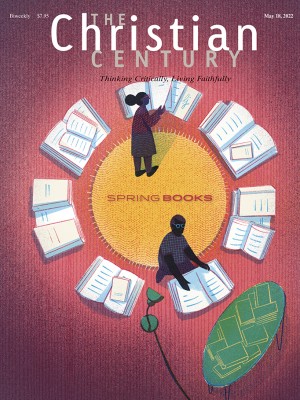You might not expect America’s most famous recluse, Henry David Thoreau, to be a very good guide through the urgent ethical issues of our time. You might consult him when discussing the environment, since he seemed to prefer ponds to people. However, on issues like racism or politics, you probably wouldn’t think that a person holed up in the woods has much to offer.
On the contrary, argues Alda Balthrop-Lewis. Not only is the environment deeply related to racism and politics, but solitude contains its own form of engagement with these issues. Thoreau helps us out of the either-or dilemmas that dog our moral lives, Balthrop-Lewis argues in Thoreau’s Religion: Walden Woods, Social Justice, and the Politics of Asceticism (Cambridge University Press). Balthrop-Lewis portrays Thoreau as possessed of a wide ecology of diverse ethical concerns and commitments. What many people hold apart, like environmentalism and antiracism, Thoreau holds together, unified in “one man, one life.”
Read our latest issue or browse back issues.
Balthrop-Lewis, an American religious ethicist at Australian Catholic University, unearths from within Thoreau’s life and thought powerful formulations that can inform everything from the afterlife of slavery to contemporary political life. She challenges unhelpful ways of thinking about engagement and withdrawal, turning on its head any suggestion that Thoreau was too withdrawn to be engaged. She speaks instead of a “dynamic within Thoreau’s writing between his desire for solitude and his investment in community.”
For Balthrop-Lewis, it is precisely the movement between solitude and community that proves so powerful. Rather than abandoning solitude to solipsism, she shows the ethical work that solitude does—especially as a form of renunciation or dispossession, a way of gaining community by giving it up. Tying Thoreau to religious dispossession and therefore our own everyday forms of ascetic solitude, she writes that “even the most seemingly lonely practices–as, for instance, sitting alone in a room, writing, as I am now, or reading, as you are–contribute to the forms of society and politics that are to come.”
Many of us worry that we work too much, noticing we spend more time at work than at home or at church. We wonder if perhaps we love and trust our salaries more than we love and trust God. We might not be wrong, and we’re certainly not alone. According to Berkeley professor Carolyn Chen, Americans worship work. We love our careers with a love previously reserved for God.
In Work Pray Code: When Work Becomes Religion in Silicon Valley (Princeton University Press), Chen digs into America’s work worship, especially as it takes place in the most innovative and enterprising sectors of the global economy. She conducted interviews with Silicon Valley tech workers and learned the ins and outs of gig economy work culture. She shows how jobs now replace God, overtime crowds out Bible study, and company mission statements inspire people the way mission trips used to. Where people once found identity and purpose in Christianity or Islam, they now find them working for Google or Apple. Many find more meaning at work than at the houses of worship they go to.
Or used to go to. Chen traces a parallel between the rise of religious nones (those who claim no religious affiliation) and the tech industry’s meteoric rise. She recounts the story of a computer engineer who grew up as an evangelical Christian. His faith informed his decision to pursue programming. But once there, he found that the inspiration and identity work provided soon outpaced anything Christianity could offer. In other cases, work does not so much replace religion as provide it. Chen describes how tech companies are increasingly turning to religious practices or religious gurus to inspire greater devotion among employees.
The result of all this work worship and office-based religion? You guessed it—more hours, greater productivity, and larger profits. Chen reminds us that work is a fickle god, one that loves us only conditionally. She calls us back to genuine worship, to communities that care about us beyond what we can produce, and to purpose and identity untethered to stock options.
In Reparations: A Christian Call for Repentance and Repair (Brazos), pastors Duke L. Kwon and Gregory Thompson argue that American chattel slavery should be understood for what it was: theft. Slavers stole from slaves. As such, justice requires repayment of what is owed, or reparations, to those who were—and, crucially, still are—stolen from. Framing the matter so straightforwardly allows Kwon and Thompson to make a straightforward argument for repaying what was stolen over the centuries that America became rich and powerful, literally on the backs of Black Americans.
Kwon and Thompson are careful to note that slavers and those benefiting from slavery stole far more than labor and thus owe far more than wages—namely, truth, power, and wealth (although they owe at least wages). The authors address this challenge specifically to Christians, making a Christian case for reparations that Christians owe. By doing so, they make reparations an issue of faithfulness, or conversely, unfaithfulness.
The straightforwardness of Kwon and Thompson’s case makes things as simple as possible in order to raise the stakes as high as possible. Will those who stole or have benefited from this theft repay what they owe? Will they do so as part of God’s redemption, or repair, of all things? In what ways can our many current troubles be explained by people refusing, for whatever reason, to repay what they owe and repair what they broke?
Kwon and Thompson make their case with impressive clarity and power. They leave it to others to explain what reparation specifically requires, how much it costs, and whether nations built on slavery can survive the necessary scope and scale of reparations. Those who read this book are faced with more basic questions: Why haven’t we paid? What does it cost to not pay?
In American universities and colleges, there’s a movement afoot to rescue the humanities. According to the would-be rescuers, the world is going to hell in a handbasket; the driver is the loss of the humanities in higher education; ergo, to save the world we need to save the humanities. There’s a lily-White version of this effort, where “the world” stands in for the world of wealthy White men and “the humanities” names their sacred texts. Save the sacred texts and you’ll save the wealthy, White, patriarchal world. As unsavory as this vision is and as dubious are its premises, many people are drawn to it.
Roosevelt Montás intends something very different in Rescuing Socrates: How the Great Books Changed My Life and Why They Matter for a New Generation (Princeton University Press). Montás tells the story of how he came to Columbia University as a poor Dominican immigrant. Through the school’s legendary Core Curriculum undergraduate course of study, one of higher education’s last remaining great books programs, Montás found his way into another America. This America (discovered through reading Augustine, Plato, Freud, and Gandhi) not only departs from the America of White privileged men but seriously challenges it.
Montás, now on the faculty of Columbia’s Core Curriculum, invites us into a vision that rescued him long ago and might rescue America still. Challenging the lily-White version by showing the liberating power of a genuinely liberal education, Montás offers something of an intervention. Rather than cancel America’s sacred texts, we need to read them—and in reading them, we will find our revolutionary impulses inspired and renewed.
Montás returns the humanities to its revolutionary home, reminding us that we are, after all, talking about such radical and subversive thinkers as Augustine, Plato, Freud, and Gandhi. He teaches us, presumably like he teaches his Core Curriculum students, what those thinkers were after—and what reading them makes possible.
Read NaShieka Knight's Old Testament selections and Jason Micheli's theology selections.










